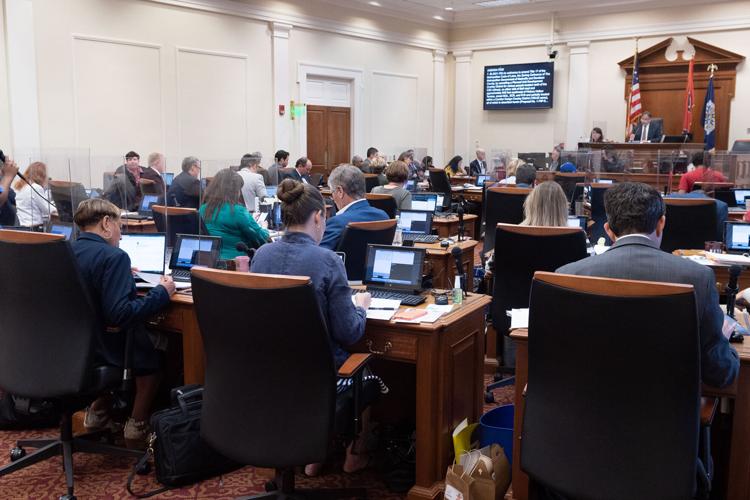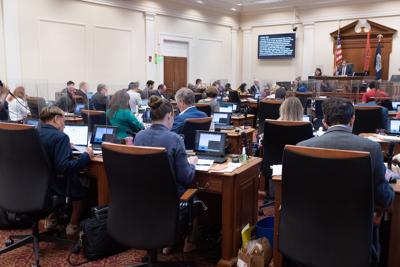Gov. Bill Lee signed legislation last week to cut Nashville’s 40-member Metro Council, a product of the civil rights era, in half. With a reduction in the body’s number of seats, historical experts, state legislators and councilmembers say we could lose not only minority representation, but class representation along with it.
The Metropolitan Government of Nashville and Davidson County was created in 1963 after a previous attempt to consolidate the city and county failed, with Black voters and greater Davidson County voters in opposition. Davidson County needed access to public resources that the city could provide, and the city needed access to a larger tax base to provide those resources — but a referendum on consolidation failed in 1958.
“So the new commission started by saying, ‘What did we do wrong, why did it not pass?’” says Davidson County Historian Carole Bucy. “And the thing they came up with was: not a big enough council to represent all the people.” Bucy says that after interviewing 33 people who were involved with the consolidation, she found that the only major difference between the first attempt and the second was an increase in the proposed council size — from 21 to 40.
The 40-person legislative body — 35 district representatives and five at-large members — has remained in place ever since. In 2017, Davidson County voters were given the opportunity to vote on a referendum to reduce the size of the council to 27 members. They resoundingly voted no.
“The council will automatically, if you have it down to 20, represent twice as many people as they represent now,” says Bucy. “And the population has grown so much since ’63, when we had created the 40-member council. So you know, being a councilperson is going to [become] a full-time job.”
With the August elections fast approaching, Metro is scrambling to prepare for a smaller council, redrawing districts, and possibly budgeting to pay councilmembers full time. Many of the members hold day jobs, and with the increase in responsibilities this legislation would bring, some are worried it would make it difficult for everyday Nashvillians to run for seats.

Councilmember At-Large Zulfat Suara
“It becomes, who can raise the most money?” says Councilmember At-Large Zulfat Suara. “It becomes who can campaign? And it means that [historically Black] North Nashville, which has three representatives, may end up only having one.”
Suara, who secured the fifth and final at-large spot in the 2019 runoff election, says that had this legislation gone into effect four years ago, she does not think she would have been able to win a seat. One possibility should Nashville be forced to reconfigure its council is a body with 17 district representatives and three at-large representatives. Presumably, campaigning for those seats would require more resources than campaigning for one of 35 districts or five at-large seats. And with it still being unclear how many at-large seats would exist following redistricting, Suara is skeptical that she would be able to win a seat on a 20-person council even now.
“I don’t even know if people in the Muslim community will be able to have that much access without somebody saying, ‘We’re here too,’” says Suara, who is Muslim. “Or the Hispanic community. That’s what [Latina Councilmember Sandra Sepulveda] does. And so those voices that allow us to serve all of Nashville could be silenced.”
This legislation arrives alongside a number of bills still under consideration that many see as attacks on Nashville, including a bill to take over the sports authority board and another that would eliminate runoff elections. Many see these bills as retaliation from the state over the Metro Council’s decision not to host the 2024 Republican National Convention in Nashville. But newly elected state Sen. Charlane Oliver (D-Nashville) points to the silence of organizations like the Nashville Area Chamber of Commerce and the Nashville Convention & Visitors Corp, who she says typically go to bat for Nashville, but could in this case have something to gain from the legislation.
“The timing is right before a mayoral election, when we’re about to change over the entire leadership of the city,” says Oliver. “Someone wants to profit and continue to profit off of the growth of the city and ensure that their legislation, their agenda, gets passed through the council. And how do you ensure and influence that council? By shrinking the size.”
With the bill already signed into law, Metro’s only course of action is through the courts. The city filed a suit on Monday over the legislation, which Metro Legal Director Wally Dietz says illegally targets Nashville and would be impossible to implement before the fast-approaching election.
In the suit, Metro argues that the legislation violates the home rule amendment in the Tennessee Constitution, which outlaws bills that target only one local government. Because Metro is the only metropolitan form of government with more than 20 councilmembers, it is the only local government affected by this legislation.
The suit also argues that the election cycle is already too far underway for any changes, and that the provisions in the legislation cited as solutions to the time crunch would be unconstitutional to implement.
“Over 40 candidates have already appointed treasurers and are actively raising money for council districts that ostensibly will no longer exist,” says Dietz via a statement released last week. “Even if the Planning Commission prepares a map and the current Metro Council passes a redistricting plan by May 1, the confusion and uncertainty that follows will be prime for legal challenges from a range of affected parties.”
Argues Metro in the suit: “In imposing these council-reduction requirements on Metro Nashville just before a local election, the General Assembly undermines the purpose of local-government consolidation, ignores numerous other constitutional prohibitions on such a reduction, and creates confusion and chaos among citizens and candidates. The Court must issue an injunction to halt this unconstitutional legislative overreach.”
An initial court hearing is being sought for as early as next week.







